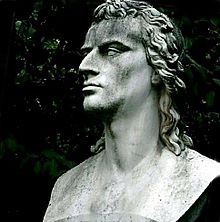Friedrich Schiller
![]()
Schiller is a redirect to this article. For other meanings, see Friedrich Schiller (disambiguation) and Schiller (disambiguation).
Johann Christoph Friedrich Schiller, from 1802 von Schiller (* 10 November 1759 in Marbach am Neckar; † 9 May 1805 in Weimar), was a physician, poet, philosopher and historian. He is considered one of the most important German dramatists, lyricists and essayists.
Friedrich Schiller was the only son of a Württemberg officer who also worked as a wound surgeon and grew up with his five sisters in Schwäbisch Gmünd, Lorch and later in Ludwigsburg. There he attended the Latin School and, after passing the Protestant State Examination four times, began studying law at the Karlsschule on January 16, 1773. Three years later he changed to medicine and received his doctorate in 1780. With his theatrical debut, the play Die Räuber (The Robbers), which premiered in 1782, Schiller made a significant contribution to the drama of Sturm und Drang and world literature.
In 1782, by now a military doctor, he fled from the sovereign Duke Karl Eugen from Württemberg to Thuringia, because he was threatened with imprisonment for unauthorized removal from service and a ban on writing. In 1783 Schiller began his first work on Don Karlos. When his employment as a playwright at the Mannheim National Theater expired, Schiller traveled to Leipzig in 1785 to visit his future patron Christian Gottfried Körner. In the following years he met Christoph Martin Wieland, Johann Gottfried Herder and Johann Wolfgang von Goethe in Weimar. Together they shaped the Weimar Classicism.
Many of his plays belong to the standard repertoire of German-language theaters. His ballads are among the best-known German poems.
Friedrich Schiller was a native of Württemberg by birth, later becoming a citizen of Saxe-Weimar. In 1792 he was awarded honorary French citizenship and thus additionally French nationality - in appreciation of his drama The Robbers, performed in Paris, which was understood as a fight for freedom against tyranny.

Schiller's bust in Jena
Schiller Awards
The following Schiller prizes were endowed:
- Schiller Prize (Prussia)
- People's Schiller Prize
- Schiller Memorial Prize of the State of Baden-Württemberg
- Schiller Prize of the City of Mannheim
- Schiller Prize of the City of Marbach am Neckar
- Schiller Prize of the Zürcher Kantonalbank
- Honorary gifts of the German Schiller Foundation
- Schiller Prize of the German Cultural Association of the European Spirit
- Grand Schiller Prize of the Swiss Schiller Foundation
- Schiller-Ring
- Friedrich von Schiller Prize (Berlin)
See also: other Schiller prizes
Other honors
The plant genus Schilleria Kunth from the pepper family (Piperaceae) is also named after Schiller.
Questions and Answers
Q: Who was Friedrich Schiller?
A: Friedrich Schiller was a German poet, philosopher, historian, and dramatist.
Q: When was Friedrich Schiller born?
A: Friedrich Schiller was born on November 10, 1759 in Marbach, Württemberg.
Q: Where did Friedrich Schiller pass away?
A: Friedrich Schiller passed away on May 9, 1805 in Weimar.
Q: What was Friedrich Schiller's profession?
A: Friedrich Schiller's profession included poet, philosopher, historian, and dramatist.
Q: What was Friedrich Schiller's full name?
A: Friedrich Schiller's full name was Johann Christoph Friedrich von Schiller.
Q: What was Friedrich Schiller known for?
A: Friedrich Schiller was known for his works as a poet, philosopher, historian, and dramatist.
Q: Where was Friedrich Schiller originally from?
A: Friedrich Schiller was originally from Marbach, Württemberg in Germany.
Search within the encyclopedia

